Nursing Assignment: Analysis of Health System, Ethics and Dilemmas
VerifiedAdded on 2019/09/30
|9
|2744
|350
Homework Assignment
AI Summary
This nursing assignment begins by outlining the five key components of a well-functioning health system as suggested by the World Health Organization (WHO) in 2010, emphasizing the importance of improving health status, defending against threats, financial protection, equal care, and patient participation. The assignment then compares macro and micro approaches to health, highlighting challenges at both levels, such as patient empowerment and policy problems. Part B introduces medical ethics in healthcare, discussing the importance of values and patient-centered care. The core of the assignment presents a case study involving a patient with terminal cancer, his daughter's use of Chinese medicine, and the ethical dilemmas faced by a nurse. The discussion analyzes the nurse's conflicting duties, the importance of respecting patient and family values, and the principles of beneficence and non-maleficence. The assignment underscores the complexities of ethical decision-making in healthcare, where adherence to organizational rules must be balanced with compassion and patient well-being.
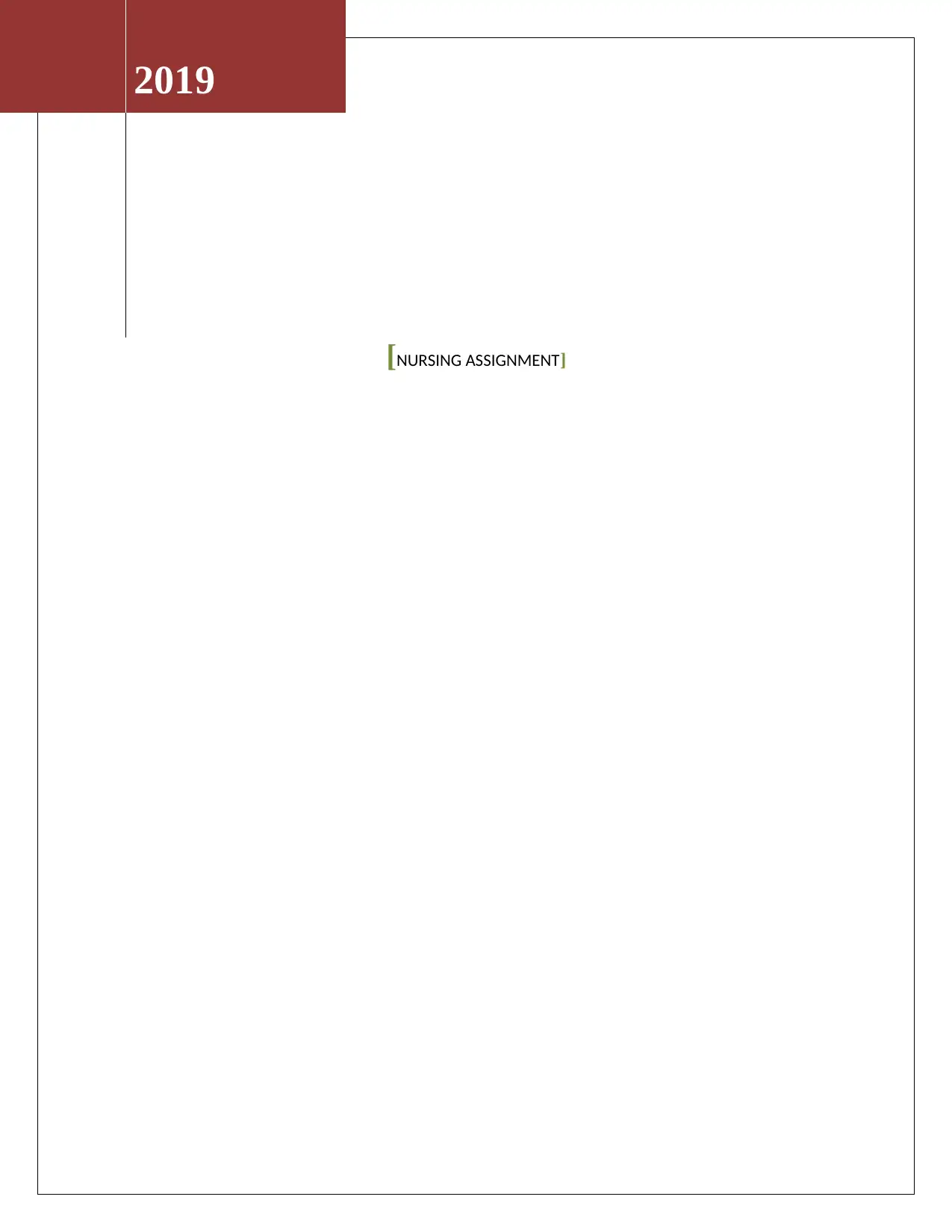
[NURSING ASSIGNMENT]
2019
2019
Paraphrase This Document
Need a fresh take? Get an instant paraphrase of this document with our AI Paraphraser
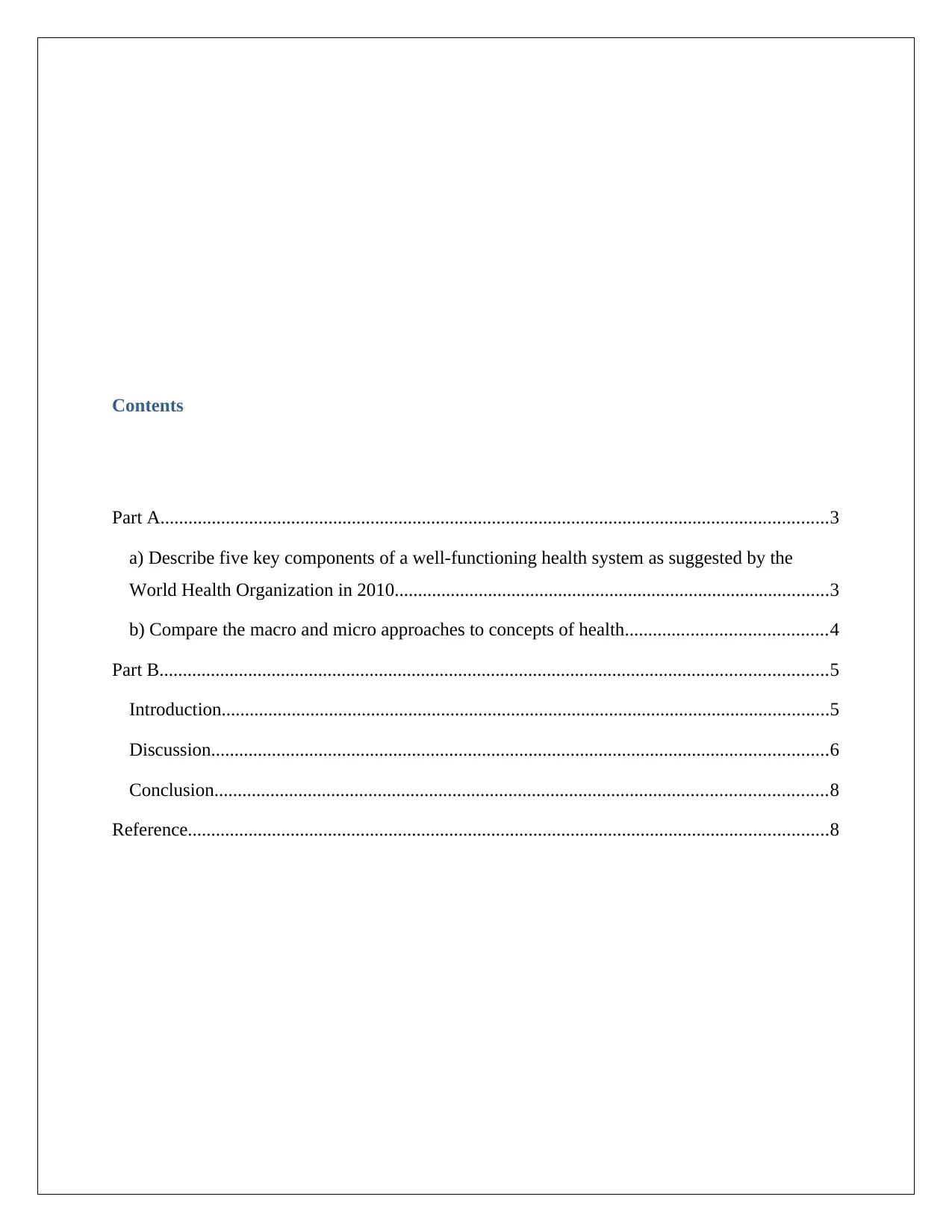
Contents
Part A...............................................................................................................................................3
a) Describe five key components of a well-functioning health system as suggested by the
World Health Organization in 2010.............................................................................................3
b) Compare the macro and micro approaches to concepts of health...........................................4
Part B...............................................................................................................................................5
Introduction..................................................................................................................................5
Discussion....................................................................................................................................6
Conclusion...................................................................................................................................8
Reference.........................................................................................................................................8
Part A...............................................................................................................................................3
a) Describe five key components of a well-functioning health system as suggested by the
World Health Organization in 2010.............................................................................................3
b) Compare the macro and micro approaches to concepts of health...........................................4
Part B...............................................................................................................................................5
Introduction..................................................................................................................................5
Discussion....................................................................................................................................6
Conclusion...................................................................................................................................8
Reference.........................................................................................................................................8
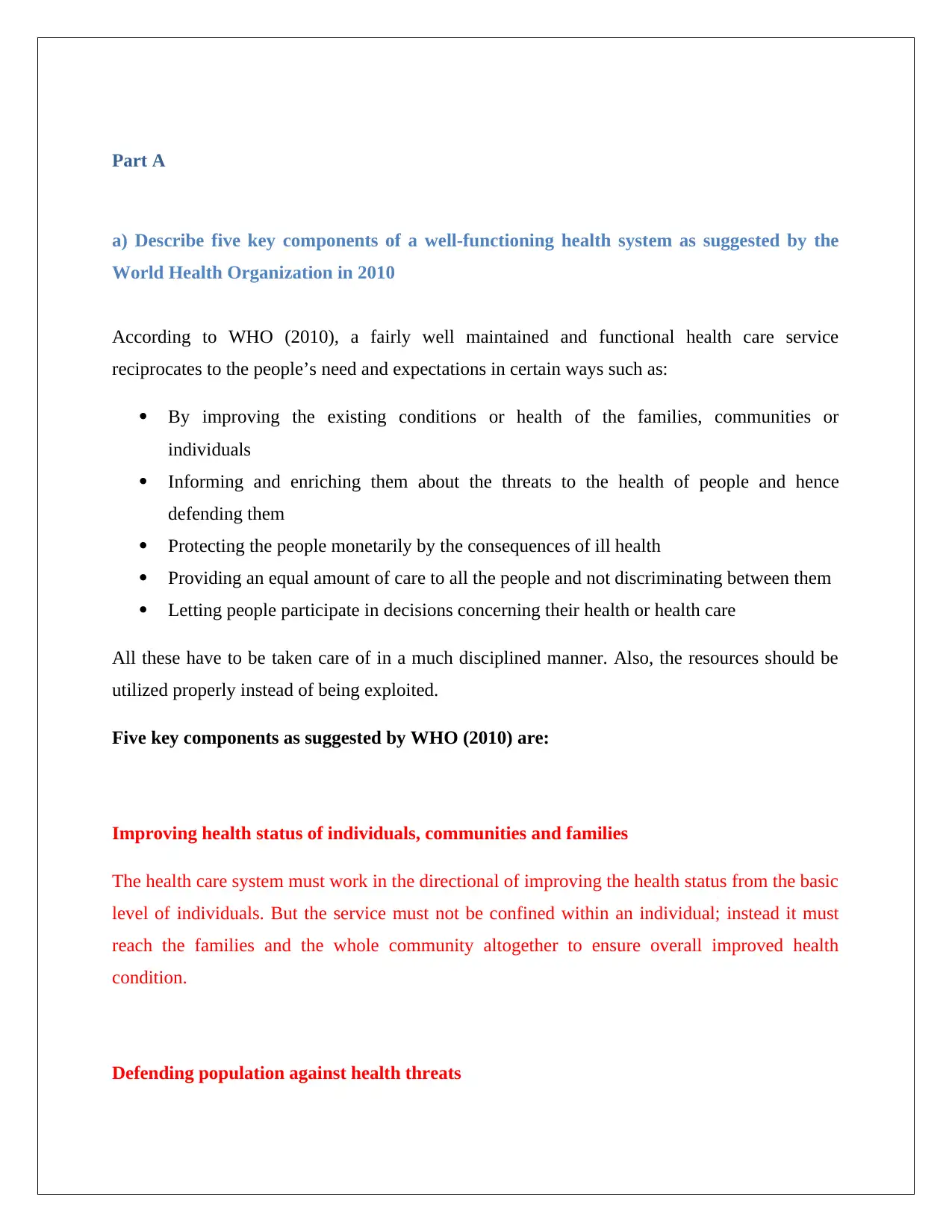
Part A
a) Describe five key components of a well-functioning health system as suggested by the
World Health Organization in 2010
According to WHO (2010), a fairly well maintained and functional health care service
reciprocates to the people’s need and expectations in certain ways such as:
By improving the existing conditions or health of the families, communities or
individuals
Informing and enriching them about the threats to the health of people and hence
defending them
Protecting the people monetarily by the consequences of ill health
Providing an equal amount of care to all the people and not discriminating between them
Letting people participate in decisions concerning their health or health care
All these have to be taken care of in a much disciplined manner. Also, the resources should be
utilized properly instead of being exploited.
Five key components as suggested by WHO (2010) are:
Improving health status of individuals, communities and families
The health care system must work in the directional of improving the health status from the basic
level of individuals. But the service must not be confined within an individual; instead it must
reach the families and the whole community altogether to ensure overall improved health
condition.
Defending population against health threats
a) Describe five key components of a well-functioning health system as suggested by the
World Health Organization in 2010
According to WHO (2010), a fairly well maintained and functional health care service
reciprocates to the people’s need and expectations in certain ways such as:
By improving the existing conditions or health of the families, communities or
individuals
Informing and enriching them about the threats to the health of people and hence
defending them
Protecting the people monetarily by the consequences of ill health
Providing an equal amount of care to all the people and not discriminating between them
Letting people participate in decisions concerning their health or health care
All these have to be taken care of in a much disciplined manner. Also, the resources should be
utilized properly instead of being exploited.
Five key components as suggested by WHO (2010) are:
Improving health status of individuals, communities and families
The health care system must work in the directional of improving the health status from the basic
level of individuals. But the service must not be confined within an individual; instead it must
reach the families and the whole community altogether to ensure overall improved health
condition.
Defending population against health threats
⊘ This is a preview!⊘
Do you want full access?
Subscribe today to unlock all pages.

Trusted by 1+ million students worldwide
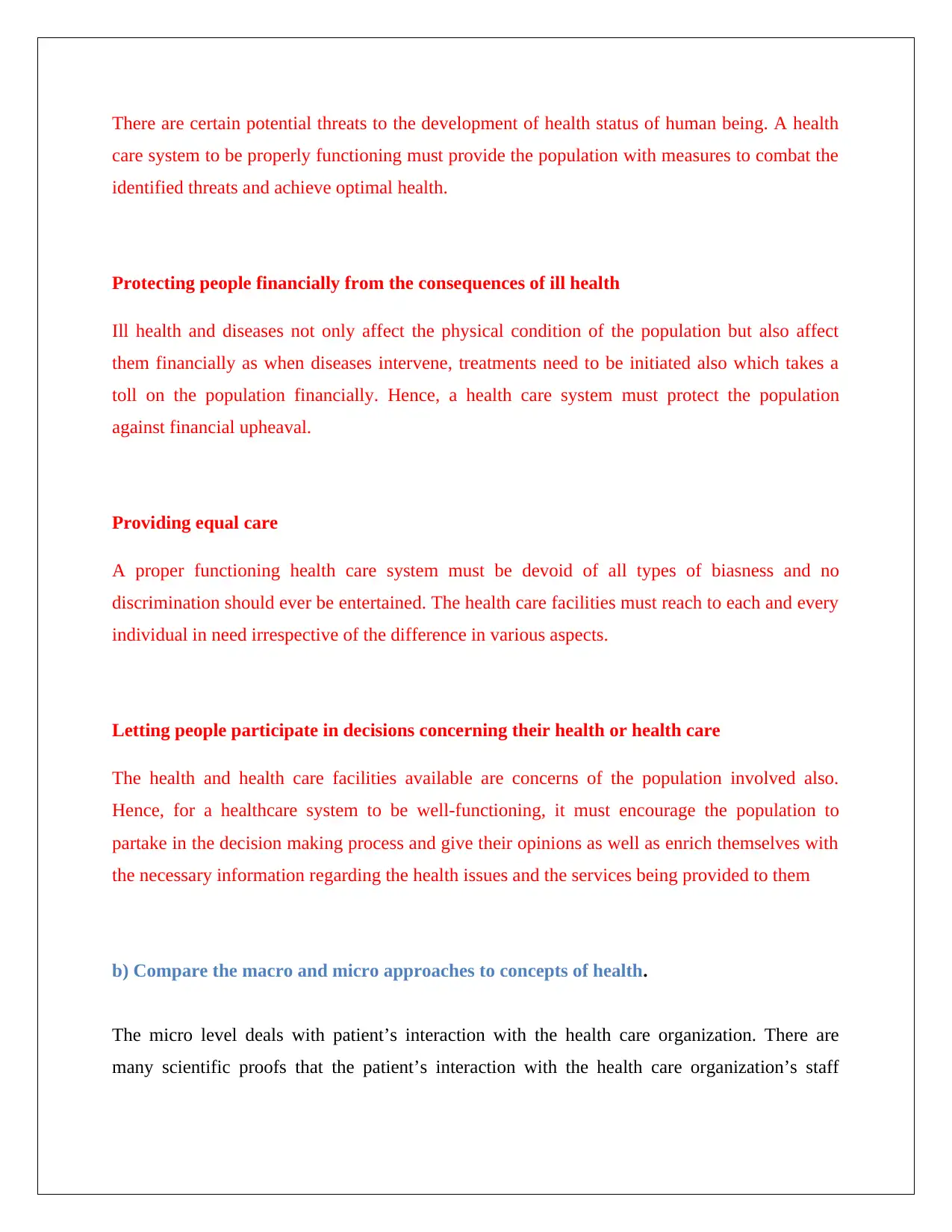
There are certain potential threats to the development of health status of human being. A health
care system to be properly functioning must provide the population with measures to combat the
identified threats and achieve optimal health.
Protecting people financially from the consequences of ill health
Ill health and diseases not only affect the physical condition of the population but also affect
them financially as when diseases intervene, treatments need to be initiated also which takes a
toll on the population financially. Hence, a health care system must protect the population
against financial upheaval.
Providing equal care
A proper functioning health care system must be devoid of all types of biasness and no
discrimination should ever be entertained. The health care facilities must reach to each and every
individual in need irrespective of the difference in various aspects.
Letting people participate in decisions concerning their health or health care
The health and health care facilities available are concerns of the population involved also.
Hence, for a healthcare system to be well-functioning, it must encourage the population to
partake in the decision making process and give their opinions as well as enrich themselves with
the necessary information regarding the health issues and the services being provided to them
b) Compare the macro and micro approaches to concepts of health.
The micro level deals with patient’s interaction with the health care organization. There are
many scientific proofs that the patient’s interaction with the health care organization’s staff
care system to be properly functioning must provide the population with measures to combat the
identified threats and achieve optimal health.
Protecting people financially from the consequences of ill health
Ill health and diseases not only affect the physical condition of the population but also affect
them financially as when diseases intervene, treatments need to be initiated also which takes a
toll on the population financially. Hence, a health care system must protect the population
against financial upheaval.
Providing equal care
A proper functioning health care system must be devoid of all types of biasness and no
discrimination should ever be entertained. The health care facilities must reach to each and every
individual in need irrespective of the difference in various aspects.
Letting people participate in decisions concerning their health or health care
The health and health care facilities available are concerns of the population involved also.
Hence, for a healthcare system to be well-functioning, it must encourage the population to
partake in the decision making process and give their opinions as well as enrich themselves with
the necessary information regarding the health issues and the services being provided to them
b) Compare the macro and micro approaches to concepts of health.
The micro level deals with patient’s interaction with the health care organization. There are
many scientific proofs that the patient’s interaction with the health care organization’s staff
Paraphrase This Document
Need a fresh take? Get an instant paraphrase of this document with our AI Paraphraser
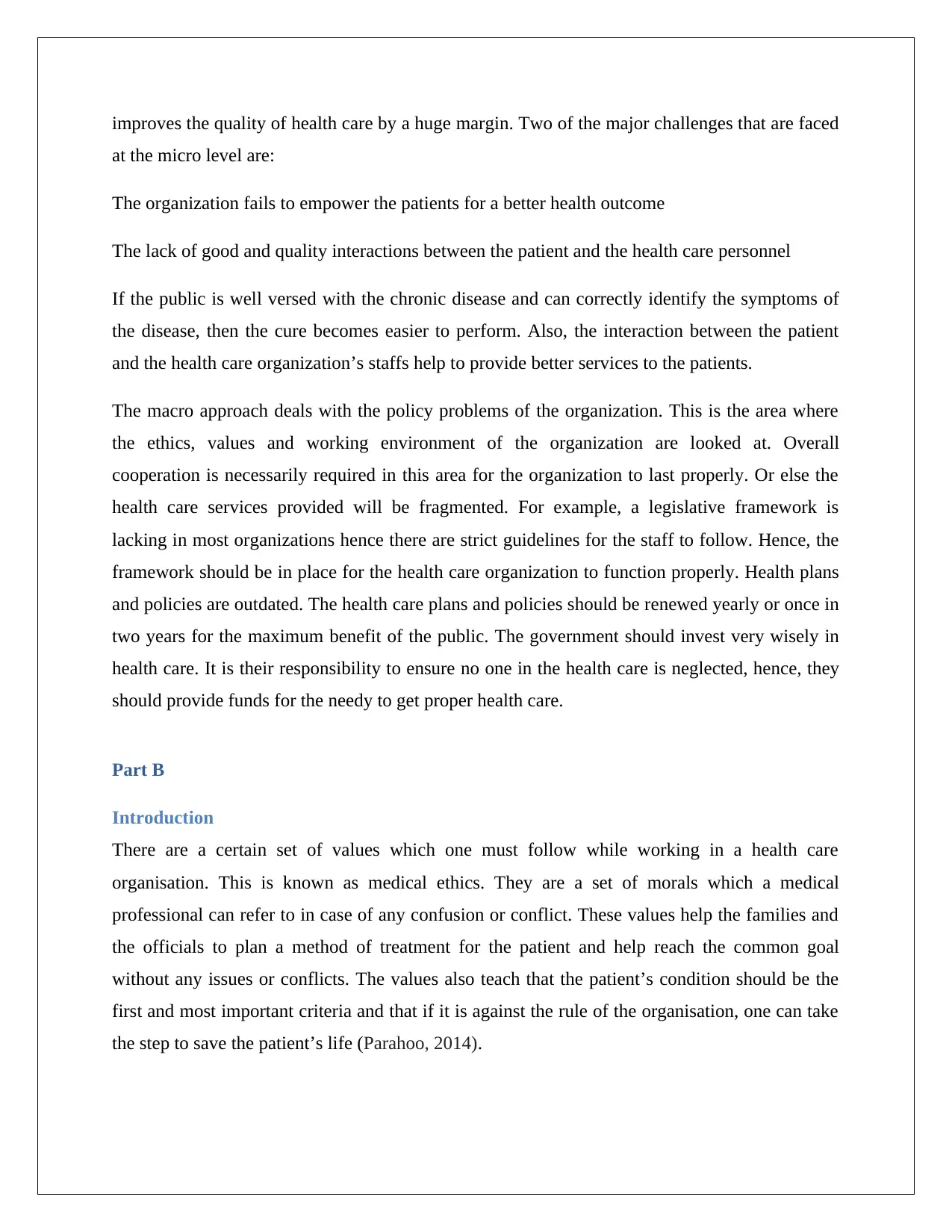
improves the quality of health care by a huge margin. Two of the major challenges that are faced
at the micro level are:
The organization fails to empower the patients for a better health outcome
The lack of good and quality interactions between the patient and the health care personnel
If the public is well versed with the chronic disease and can correctly identify the symptoms of
the disease, then the cure becomes easier to perform. Also, the interaction between the patient
and the health care organization’s staffs help to provide better services to the patients.
The macro approach deals with the policy problems of the organization. This is the area where
the ethics, values and working environment of the organization are looked at. Overall
cooperation is necessarily required in this area for the organization to last properly. Or else the
health care services provided will be fragmented. For example, a legislative framework is
lacking in most organizations hence there are strict guidelines for the staff to follow. Hence, the
framework should be in place for the health care organization to function properly. Health plans
and policies are outdated. The health care plans and policies should be renewed yearly or once in
two years for the maximum benefit of the public. The government should invest very wisely in
health care. It is their responsibility to ensure no one in the health care is neglected, hence, they
should provide funds for the needy to get proper health care.
Part B
Introduction
There are a certain set of values which one must follow while working in a health care
organisation. This is known as medical ethics. They are a set of morals which a medical
professional can refer to in case of any confusion or conflict. These values help the families and
the officials to plan a method of treatment for the patient and help reach the common goal
without any issues or conflicts. The values also teach that the patient’s condition should be the
first and most important criteria and that if it is against the rule of the organisation, one can take
the step to save the patient’s life (Parahoo, 2014).
at the micro level are:
The organization fails to empower the patients for a better health outcome
The lack of good and quality interactions between the patient and the health care personnel
If the public is well versed with the chronic disease and can correctly identify the symptoms of
the disease, then the cure becomes easier to perform. Also, the interaction between the patient
and the health care organization’s staffs help to provide better services to the patients.
The macro approach deals with the policy problems of the organization. This is the area where
the ethics, values and working environment of the organization are looked at. Overall
cooperation is necessarily required in this area for the organization to last properly. Or else the
health care services provided will be fragmented. For example, a legislative framework is
lacking in most organizations hence there are strict guidelines for the staff to follow. Hence, the
framework should be in place for the health care organization to function properly. Health plans
and policies are outdated. The health care plans and policies should be renewed yearly or once in
two years for the maximum benefit of the public. The government should invest very wisely in
health care. It is their responsibility to ensure no one in the health care is neglected, hence, they
should provide funds for the needy to get proper health care.
Part B
Introduction
There are a certain set of values which one must follow while working in a health care
organisation. This is known as medical ethics. They are a set of morals which a medical
professional can refer to in case of any confusion or conflict. These values help the families and
the officials to plan a method of treatment for the patient and help reach the common goal
without any issues or conflicts. The values also teach that the patient’s condition should be the
first and most important criteria and that if it is against the rule of the organisation, one can take
the step to save the patient’s life (Parahoo, 2014).
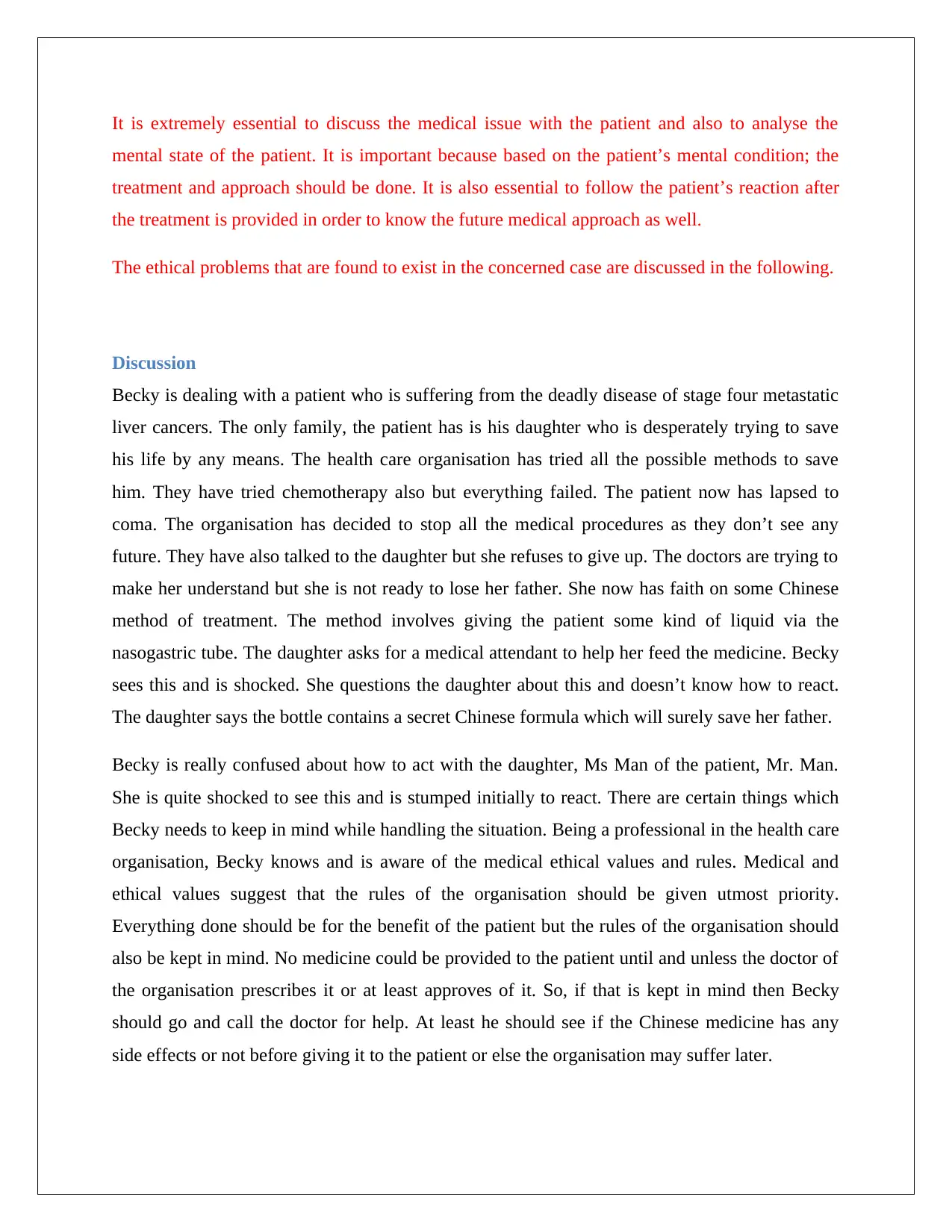
It is extremely essential to discuss the medical issue with the patient and also to analyse the
mental state of the patient. It is important because based on the patient’s mental condition; the
treatment and approach should be done. It is also essential to follow the patient’s reaction after
the treatment is provided in order to know the future medical approach as well.
The ethical problems that are found to exist in the concerned case are discussed in the following.
Discussion
Becky is dealing with a patient who is suffering from the deadly disease of stage four metastatic
liver cancers. The only family, the patient has is his daughter who is desperately trying to save
his life by any means. The health care organisation has tried all the possible methods to save
him. They have tried chemotherapy also but everything failed. The patient now has lapsed to
coma. The organisation has decided to stop all the medical procedures as they don’t see any
future. They have also talked to the daughter but she refuses to give up. The doctors are trying to
make her understand but she is not ready to lose her father. She now has faith on some Chinese
method of treatment. The method involves giving the patient some kind of liquid via the
nasogastric tube. The daughter asks for a medical attendant to help her feed the medicine. Becky
sees this and is shocked. She questions the daughter about this and doesn’t know how to react.
The daughter says the bottle contains a secret Chinese formula which will surely save her father.
Becky is really confused about how to act with the daughter, Ms Man of the patient, Mr. Man.
She is quite shocked to see this and is stumped initially to react. There are certain things which
Becky needs to keep in mind while handling the situation. Being a professional in the health care
organisation, Becky knows and is aware of the medical ethical values and rules. Medical and
ethical values suggest that the rules of the organisation should be given utmost priority.
Everything done should be for the benefit of the patient but the rules of the organisation should
also be kept in mind. No medicine could be provided to the patient until and unless the doctor of
the organisation prescribes it or at least approves of it. So, if that is kept in mind then Becky
should go and call the doctor for help. At least he should see if the Chinese medicine has any
side effects or not before giving it to the patient or else the organisation may suffer later.
mental state of the patient. It is important because based on the patient’s mental condition; the
treatment and approach should be done. It is also essential to follow the patient’s reaction after
the treatment is provided in order to know the future medical approach as well.
The ethical problems that are found to exist in the concerned case are discussed in the following.
Discussion
Becky is dealing with a patient who is suffering from the deadly disease of stage four metastatic
liver cancers. The only family, the patient has is his daughter who is desperately trying to save
his life by any means. The health care organisation has tried all the possible methods to save
him. They have tried chemotherapy also but everything failed. The patient now has lapsed to
coma. The organisation has decided to stop all the medical procedures as they don’t see any
future. They have also talked to the daughter but she refuses to give up. The doctors are trying to
make her understand but she is not ready to lose her father. She now has faith on some Chinese
method of treatment. The method involves giving the patient some kind of liquid via the
nasogastric tube. The daughter asks for a medical attendant to help her feed the medicine. Becky
sees this and is shocked. She questions the daughter about this and doesn’t know how to react.
The daughter says the bottle contains a secret Chinese formula which will surely save her father.
Becky is really confused about how to act with the daughter, Ms Man of the patient, Mr. Man.
She is quite shocked to see this and is stumped initially to react. There are certain things which
Becky needs to keep in mind while handling the situation. Being a professional in the health care
organisation, Becky knows and is aware of the medical ethical values and rules. Medical and
ethical values suggest that the rules of the organisation should be given utmost priority.
Everything done should be for the benefit of the patient but the rules of the organisation should
also be kept in mind. No medicine could be provided to the patient until and unless the doctor of
the organisation prescribes it or at least approves of it. So, if that is kept in mind then Becky
should go and call the doctor for help. At least he should see if the Chinese medicine has any
side effects or not before giving it to the patient or else the organisation may suffer later.
⊘ This is a preview!⊘
Do you want full access?
Subscribe today to unlock all pages.

Trusted by 1+ million students worldwide
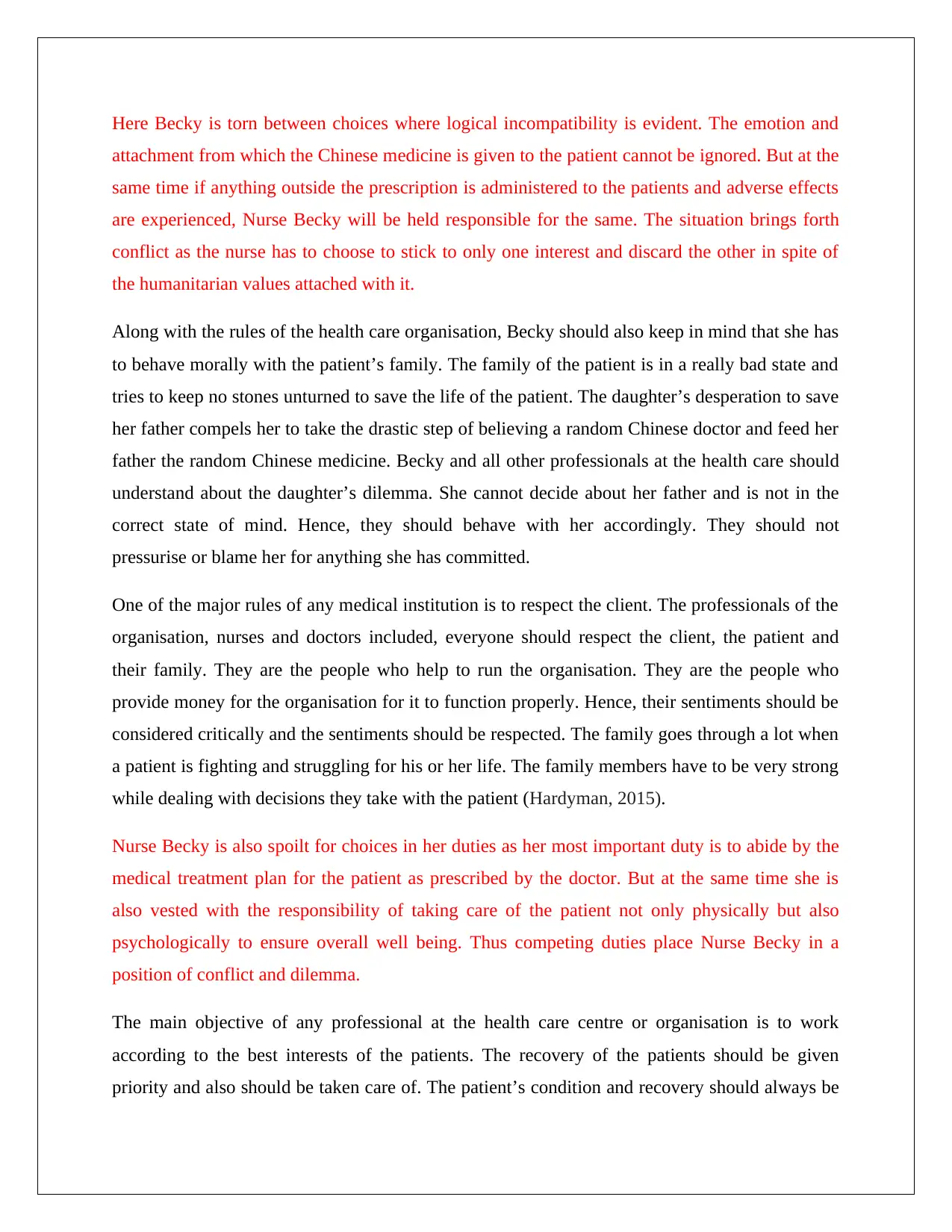
Here Becky is torn between choices where logical incompatibility is evident. The emotion and
attachment from which the Chinese medicine is given to the patient cannot be ignored. But at the
same time if anything outside the prescription is administered to the patients and adverse effects
are experienced, Nurse Becky will be held responsible for the same. The situation brings forth
conflict as the nurse has to choose to stick to only one interest and discard the other in spite of
the humanitarian values attached with it.
Along with the rules of the health care organisation, Becky should also keep in mind that she has
to behave morally with the patient’s family. The family of the patient is in a really bad state and
tries to keep no stones unturned to save the life of the patient. The daughter’s desperation to save
her father compels her to take the drastic step of believing a random Chinese doctor and feed her
father the random Chinese medicine. Becky and all other professionals at the health care should
understand about the daughter’s dilemma. She cannot decide about her father and is not in the
correct state of mind. Hence, they should behave with her accordingly. They should not
pressurise or blame her for anything she has committed.
One of the major rules of any medical institution is to respect the client. The professionals of the
organisation, nurses and doctors included, everyone should respect the client, the patient and
their family. They are the people who help to run the organisation. They are the people who
provide money for the organisation for it to function properly. Hence, their sentiments should be
considered critically and the sentiments should be respected. The family goes through a lot when
a patient is fighting and struggling for his or her life. The family members have to be very strong
while dealing with decisions they take with the patient (Hardyman, 2015).
Nurse Becky is also spoilt for choices in her duties as her most important duty is to abide by the
medical treatment plan for the patient as prescribed by the doctor. But at the same time she is
also vested with the responsibility of taking care of the patient not only physically but also
psychologically to ensure overall well being. Thus competing duties place Nurse Becky in a
position of conflict and dilemma.
The main objective of any professional at the health care centre or organisation is to work
according to the best interests of the patients. The recovery of the patients should be given
priority and also should be taken care of. The patient’s condition and recovery should always be
attachment from which the Chinese medicine is given to the patient cannot be ignored. But at the
same time if anything outside the prescription is administered to the patients and adverse effects
are experienced, Nurse Becky will be held responsible for the same. The situation brings forth
conflict as the nurse has to choose to stick to only one interest and discard the other in spite of
the humanitarian values attached with it.
Along with the rules of the health care organisation, Becky should also keep in mind that she has
to behave morally with the patient’s family. The family of the patient is in a really bad state and
tries to keep no stones unturned to save the life of the patient. The daughter’s desperation to save
her father compels her to take the drastic step of believing a random Chinese doctor and feed her
father the random Chinese medicine. Becky and all other professionals at the health care should
understand about the daughter’s dilemma. She cannot decide about her father and is not in the
correct state of mind. Hence, they should behave with her accordingly. They should not
pressurise or blame her for anything she has committed.
One of the major rules of any medical institution is to respect the client. The professionals of the
organisation, nurses and doctors included, everyone should respect the client, the patient and
their family. They are the people who help to run the organisation. They are the people who
provide money for the organisation for it to function properly. Hence, their sentiments should be
considered critically and the sentiments should be respected. The family goes through a lot when
a patient is fighting and struggling for his or her life. The family members have to be very strong
while dealing with decisions they take with the patient (Hardyman, 2015).
Nurse Becky is also spoilt for choices in her duties as her most important duty is to abide by the
medical treatment plan for the patient as prescribed by the doctor. But at the same time she is
also vested with the responsibility of taking care of the patient not only physically but also
psychologically to ensure overall well being. Thus competing duties place Nurse Becky in a
position of conflict and dilemma.
The main objective of any professional at the health care centre or organisation is to work
according to the best interests of the patients. The recovery of the patients should be given
priority and also should be taken care of. The patient’s condition and recovery should always be
Paraphrase This Document
Need a fresh take? Get an instant paraphrase of this document with our AI Paraphraser
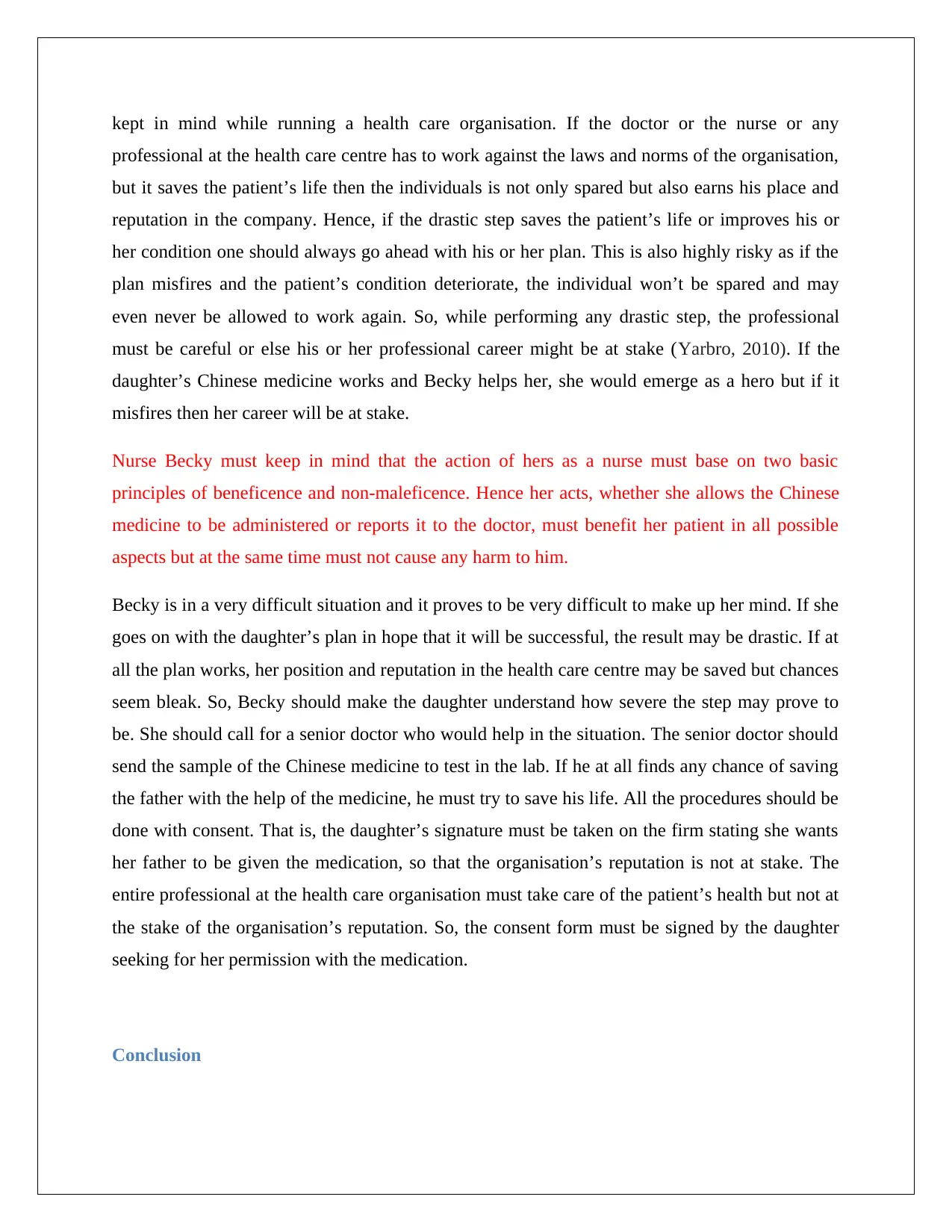
kept in mind while running a health care organisation. If the doctor or the nurse or any
professional at the health care centre has to work against the laws and norms of the organisation,
but it saves the patient’s life then the individuals is not only spared but also earns his place and
reputation in the company. Hence, if the drastic step saves the patient’s life or improves his or
her condition one should always go ahead with his or her plan. This is also highly risky as if the
plan misfires and the patient’s condition deteriorate, the individual won’t be spared and may
even never be allowed to work again. So, while performing any drastic step, the professional
must be careful or else his or her professional career might be at stake (Yarbro, 2010). If the
daughter’s Chinese medicine works and Becky helps her, she would emerge as a hero but if it
misfires then her career will be at stake.
Nurse Becky must keep in mind that the action of hers as a nurse must base on two basic
principles of beneficence and non-maleficence. Hence her acts, whether she allows the Chinese
medicine to be administered or reports it to the doctor, must benefit her patient in all possible
aspects but at the same time must not cause any harm to him.
Becky is in a very difficult situation and it proves to be very difficult to make up her mind. If she
goes on with the daughter’s plan in hope that it will be successful, the result may be drastic. If at
all the plan works, her position and reputation in the health care centre may be saved but chances
seem bleak. So, Becky should make the daughter understand how severe the step may prove to
be. She should call for a senior doctor who would help in the situation. The senior doctor should
send the sample of the Chinese medicine to test in the lab. If he at all finds any chance of saving
the father with the help of the medicine, he must try to save his life. All the procedures should be
done with consent. That is, the daughter’s signature must be taken on the firm stating she wants
her father to be given the medication, so that the organisation’s reputation is not at stake. The
entire professional at the health care organisation must take care of the patient’s health but not at
the stake of the organisation’s reputation. So, the consent form must be signed by the daughter
seeking for her permission with the medication.
Conclusion
professional at the health care centre has to work against the laws and norms of the organisation,
but it saves the patient’s life then the individuals is not only spared but also earns his place and
reputation in the company. Hence, if the drastic step saves the patient’s life or improves his or
her condition one should always go ahead with his or her plan. This is also highly risky as if the
plan misfires and the patient’s condition deteriorate, the individual won’t be spared and may
even never be allowed to work again. So, while performing any drastic step, the professional
must be careful or else his or her professional career might be at stake (Yarbro, 2010). If the
daughter’s Chinese medicine works and Becky helps her, she would emerge as a hero but if it
misfires then her career will be at stake.
Nurse Becky must keep in mind that the action of hers as a nurse must base on two basic
principles of beneficence and non-maleficence. Hence her acts, whether she allows the Chinese
medicine to be administered or reports it to the doctor, must benefit her patient in all possible
aspects but at the same time must not cause any harm to him.
Becky is in a very difficult situation and it proves to be very difficult to make up her mind. If she
goes on with the daughter’s plan in hope that it will be successful, the result may be drastic. If at
all the plan works, her position and reputation in the health care centre may be saved but chances
seem bleak. So, Becky should make the daughter understand how severe the step may prove to
be. She should call for a senior doctor who would help in the situation. The senior doctor should
send the sample of the Chinese medicine to test in the lab. If he at all finds any chance of saving
the father with the help of the medicine, he must try to save his life. All the procedures should be
done with consent. That is, the daughter’s signature must be taken on the firm stating she wants
her father to be given the medication, so that the organisation’s reputation is not at stake. The
entire professional at the health care organisation must take care of the patient’s health but not at
the stake of the organisation’s reputation. So, the consent form must be signed by the daughter
seeking for her permission with the medication.
Conclusion
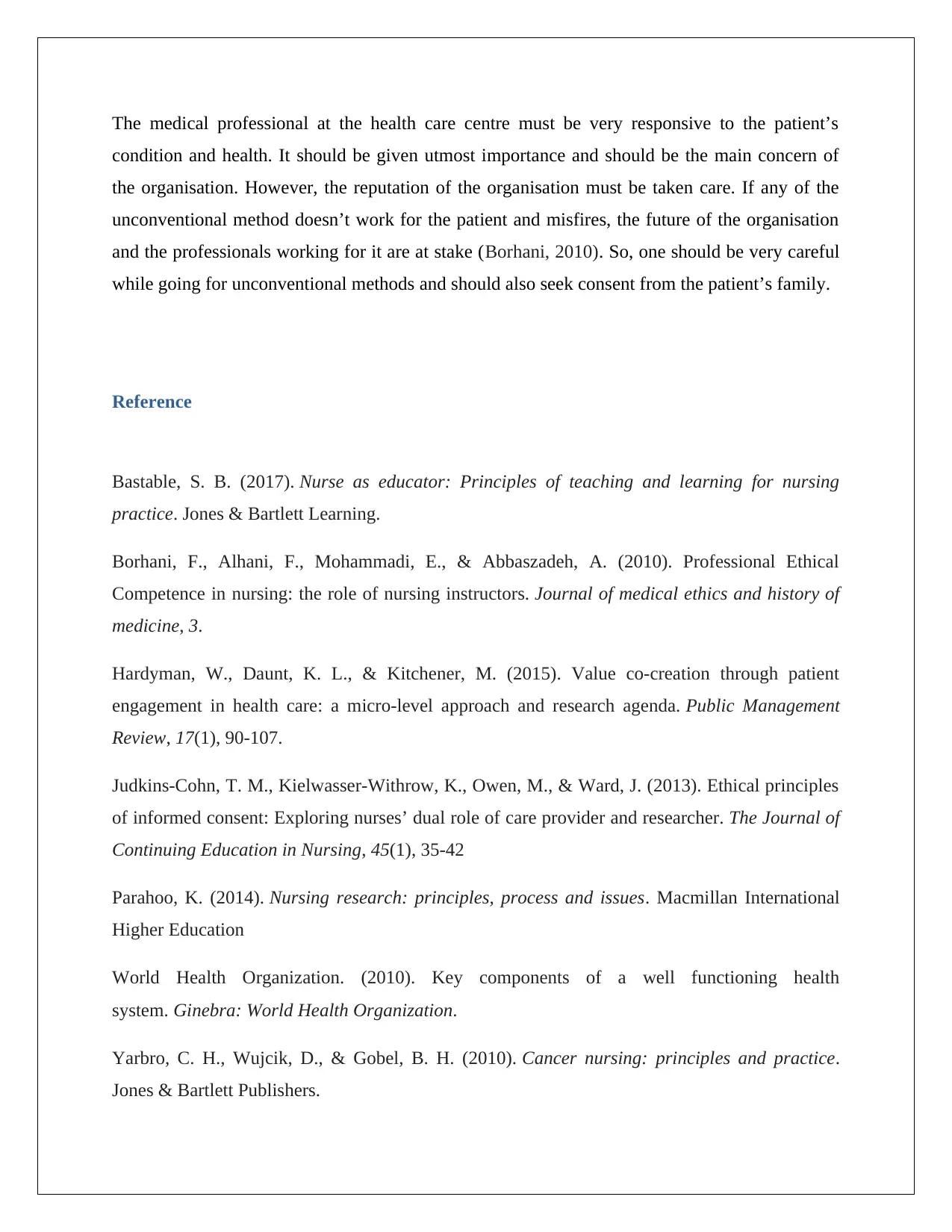
The medical professional at the health care centre must be very responsive to the patient’s
condition and health. It should be given utmost importance and should be the main concern of
the organisation. However, the reputation of the organisation must be taken care. If any of the
unconventional method doesn’t work for the patient and misfires, the future of the organisation
and the professionals working for it are at stake (Borhani, 2010). So, one should be very careful
while going for unconventional methods and should also seek consent from the patient’s family.
Reference
Bastable, S. B. (2017). Nurse as educator: Principles of teaching and learning for nursing
practice. Jones & Bartlett Learning.
Borhani, F., Alhani, F., Mohammadi, E., & Abbaszadeh, A. (2010). Professional Ethical
Competence in nursing: the role of nursing instructors. Journal of medical ethics and history of
medicine, 3.
Hardyman, W., Daunt, K. L., & Kitchener, M. (2015). Value co-creation through patient
engagement in health care: a micro-level approach and research agenda. Public Management
Review, 17(1), 90-107.
Judkins-Cohn, T. M., Kielwasser-Withrow, K., Owen, M., & Ward, J. (2013). Ethical principles
of informed consent: Exploring nurses’ dual role of care provider and researcher. The Journal of
Continuing Education in Nursing, 45(1), 35-42
Parahoo, K. (2014). Nursing research: principles, process and issues. Macmillan International
Higher Education
World Health Organization. (2010). Key components of a well functioning health
system. Ginebra: World Health Organization.
Yarbro, C. H., Wujcik, D., & Gobel, B. H. (2010). Cancer nursing: principles and practice.
Jones & Bartlett Publishers.
condition and health. It should be given utmost importance and should be the main concern of
the organisation. However, the reputation of the organisation must be taken care. If any of the
unconventional method doesn’t work for the patient and misfires, the future of the organisation
and the professionals working for it are at stake (Borhani, 2010). So, one should be very careful
while going for unconventional methods and should also seek consent from the patient’s family.
Reference
Bastable, S. B. (2017). Nurse as educator: Principles of teaching and learning for nursing
practice. Jones & Bartlett Learning.
Borhani, F., Alhani, F., Mohammadi, E., & Abbaszadeh, A. (2010). Professional Ethical
Competence in nursing: the role of nursing instructors. Journal of medical ethics and history of
medicine, 3.
Hardyman, W., Daunt, K. L., & Kitchener, M. (2015). Value co-creation through patient
engagement in health care: a micro-level approach and research agenda. Public Management
Review, 17(1), 90-107.
Judkins-Cohn, T. M., Kielwasser-Withrow, K., Owen, M., & Ward, J. (2013). Ethical principles
of informed consent: Exploring nurses’ dual role of care provider and researcher. The Journal of
Continuing Education in Nursing, 45(1), 35-42
Parahoo, K. (2014). Nursing research: principles, process and issues. Macmillan International
Higher Education
World Health Organization. (2010). Key components of a well functioning health
system. Ginebra: World Health Organization.
Yarbro, C. H., Wujcik, D., & Gobel, B. H. (2010). Cancer nursing: principles and practice.
Jones & Bartlett Publishers.
⊘ This is a preview!⊘
Do you want full access?
Subscribe today to unlock all pages.

Trusted by 1+ million students worldwide
1 out of 9
Related Documents
Your All-in-One AI-Powered Toolkit for Academic Success.
+13062052269
info@desklib.com
Available 24*7 on WhatsApp / Email
![[object Object]](/_next/static/media/star-bottom.7253800d.svg)
Unlock your academic potential
Copyright © 2020–2026 A2Z Services. All Rights Reserved. Developed and managed by ZUCOL.





